I'm a great believer in meeting people face-to-face, or at least
speaking directly on the 'phone. It's often the quickest and most
direct way to find out what's really going on behind the facade
of a web site - not all are as "up front" about their owners as mine :-)
My most recent 'phone conversations were with Dave Ulmer, who started
it all when he planted the first geocache in May 2000. He has some
interesting ideas, including that sometimes the "place" is much
more important than "what's in the box".
In September 2001 there were 'phone calls
between myself Robin, Jeremy Irish and Bryan Roth
who own and maintain the geocaching.com web site (Grounded Inc).
Contact was also been made with Dan Foster, founder of TopoGrafix, the
software company behind EasyGPS, ExpertGPS, and PanTerra.
More recently there have been 'phone conversations with the
owners of two other Geocaching web sites: Quinn Stone of navicache.com
and Jeremy Hurst of a third site now closed down.
I understand that all these enterprises are even smaller in size
and resources than my own small GPS Software business.
However this may change rapidly if geocaching takes off worldwide,
and the numbers of participants rise into the hundreds of thousands,
or even millions. These pioneers are to be congratulated on what they
have already achieved with skill, hard work and a significant part
of their own spare time.
© Robin Lovelock, Sunninghill Systems. www.gpss.co.uk
Robin Lovelock, Sunninghill Systems, 22 Armitage Court, Sunninghill, Ascot, Berks SL5 9TA, United Kingdom.
Footnote from Robin on 11th October 2015:
Today we visited the "Leviathan" geocache near Esher, the second time - the first was in 2001 !
This must be the best cache in the UK - it still has that original 2001 log book with our
visit report from then - Michelle, June and myself, could not believe it !
We read our 2001 entry in which Michelle said she's found the cache before me,
then my words after her's, saying nobody liked a smart a*** :-)
Thanks for planting this cache - just like the old days in 2001.
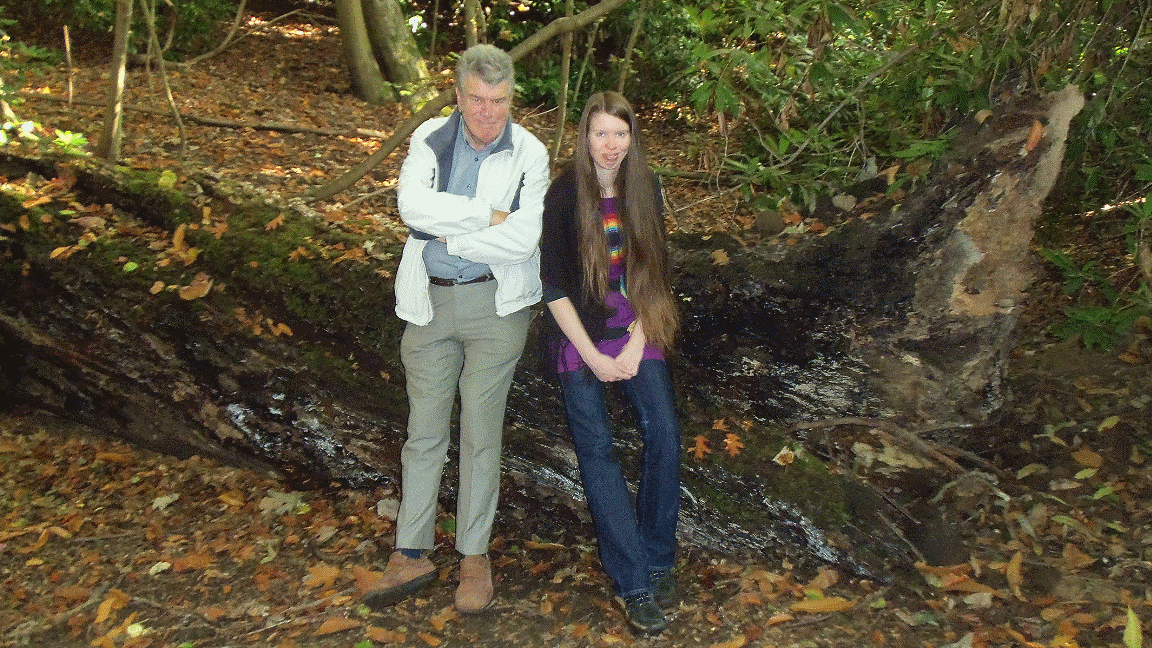
It's great to see those log enties still there in the geocaching.com logs for Leviathan ...
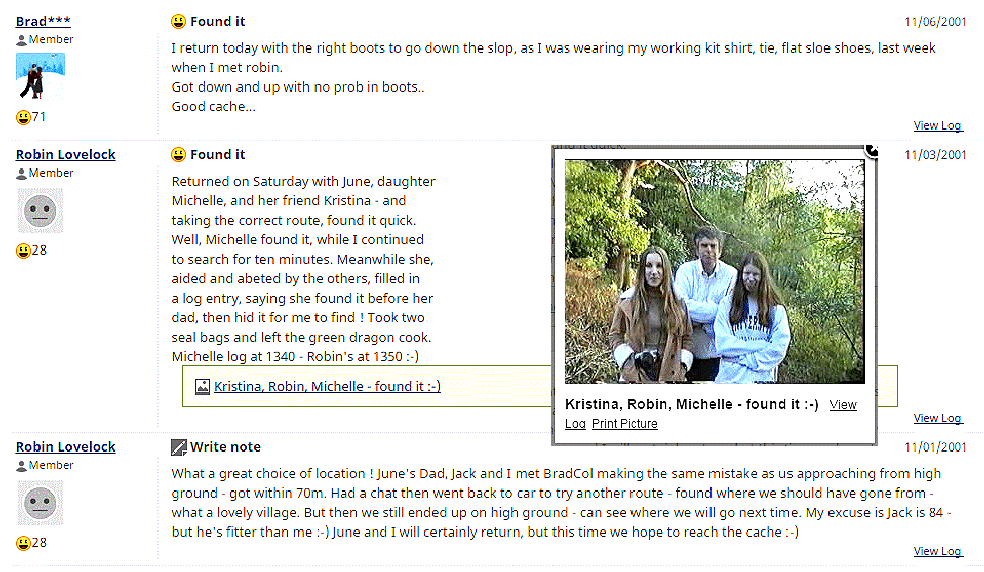
- and here are those actual log book written entries ....... :-)
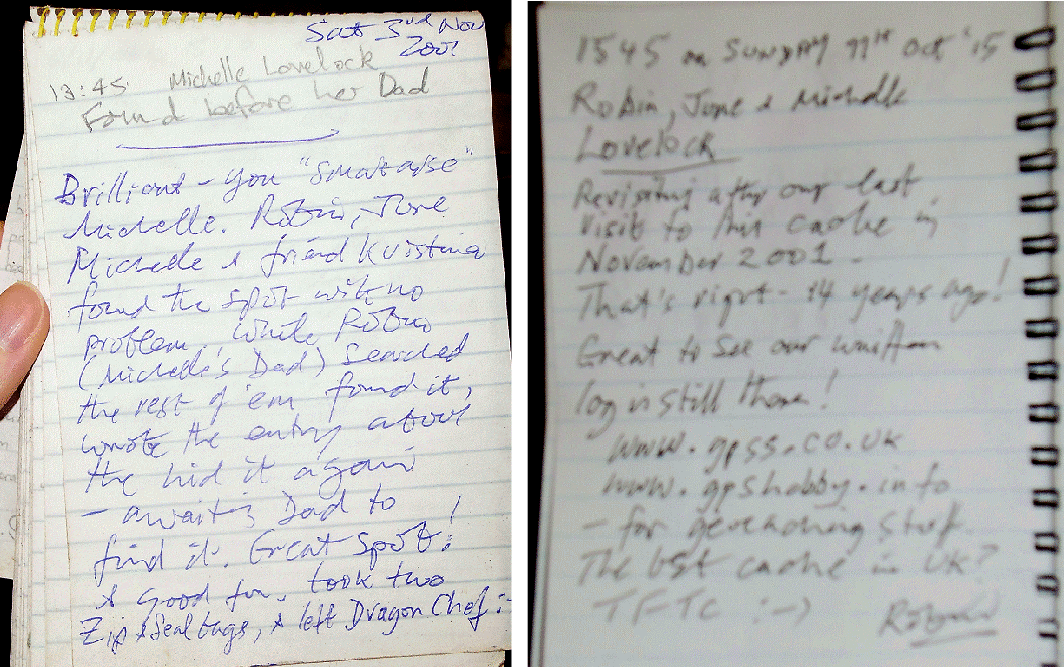
30th November 2015:
We had to visit our first cache find: "The Queen's Oak". Our old log book entry was still there - from August 2001 ! We are stood where it was then :-)
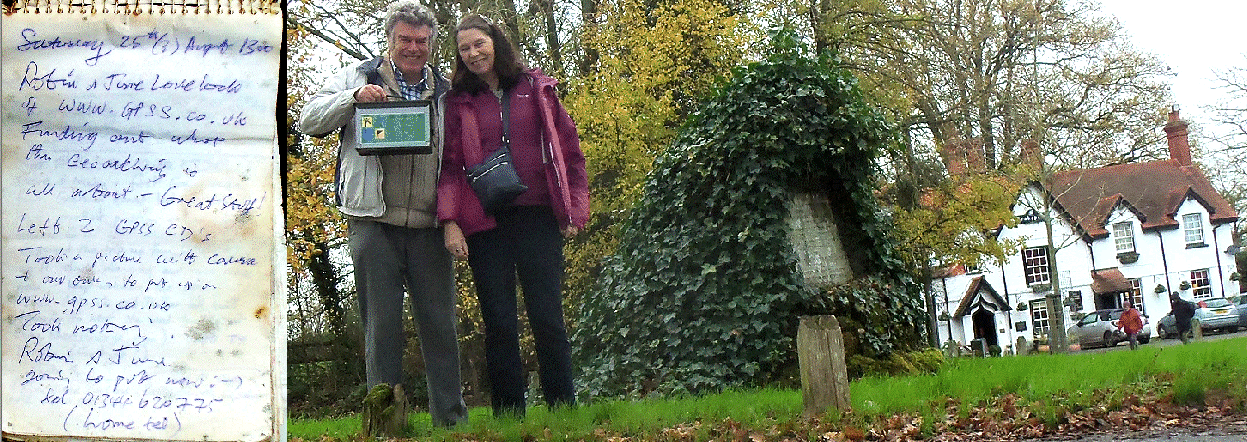
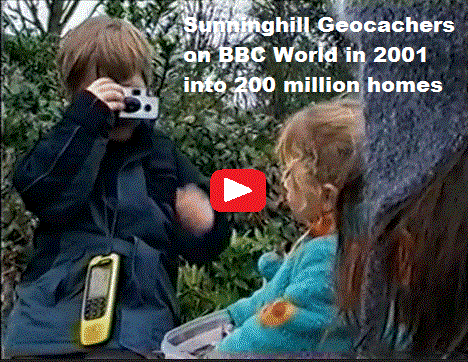 13th February 2018:
Richard Peat sent me a brilliant video that we just need to find in good quality, like an old VHS tape.
About 3m 20 secs in, there is a fantastic 2 minutes of them at their Finchamstead cache. Chris Packam
can be recognised. Check out the
Old Poor Quality Video
- we just need a better copy ! :-)
13th February 2018:
Richard Peat sent me a brilliant video that we just need to find in good quality, like an old VHS tape.
About 3m 20 secs in, there is a fantastic 2 minutes of them at their Finchamstead cache. Chris Packam
can be recognised. Check out the
Old Poor Quality Video
- we just need a better copy ! :-)
I thought I would have to find an old copy of Microsoft Office, to make a PowerPoint Briefing, as a .PPT file to put here.
However, found one on this PC, about NHSCare.info, for a Rotary Club, made on 24th August 2009, and it was done with Open Office.
So here is a test to see if you can see it. It starts with the first slide below, then follows with the slides of my old briefing.
I will obviously need to go up a learning curve ! See
Draft Talk on Geocaching
.
15th February 2018
I was very pleased to find this old video from 2001 on VHS: Sunninghill Geocaching Superstars on BBC World TV :-)
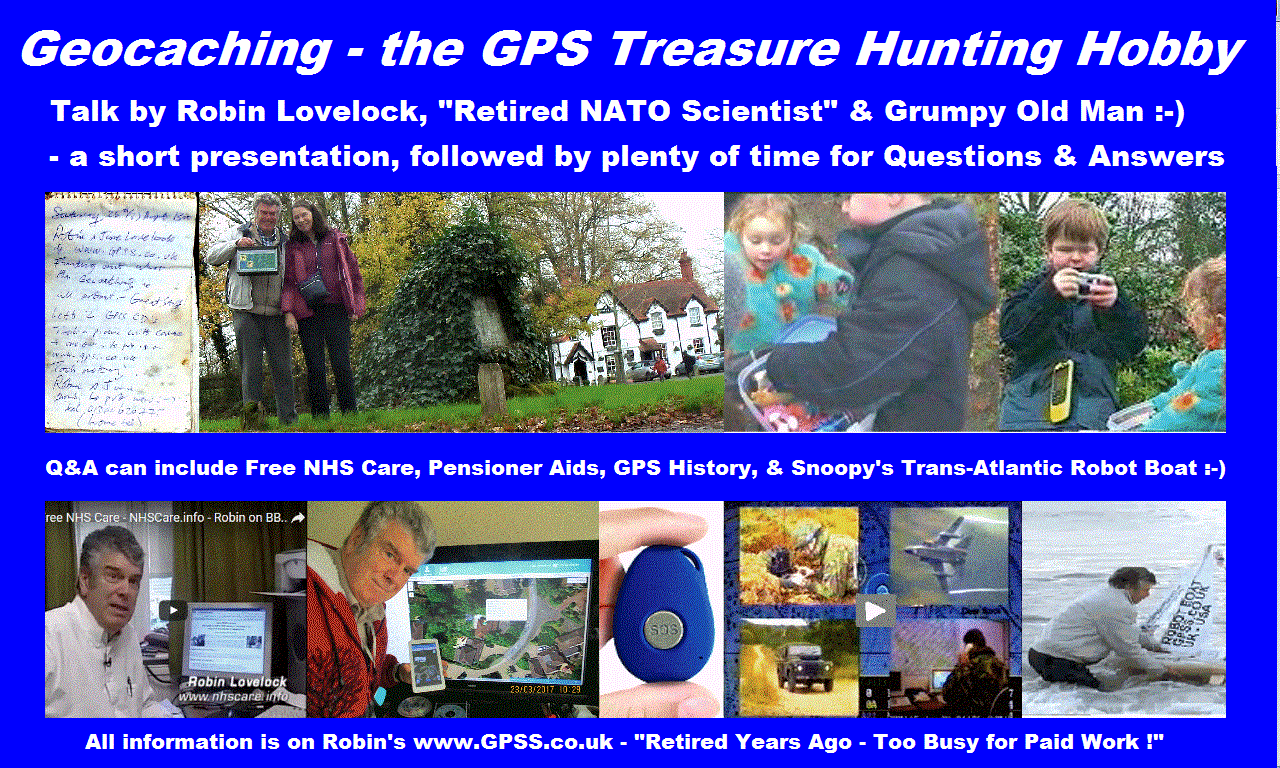
Draft of Slide 2 ... should save quite a bit of talking :-)
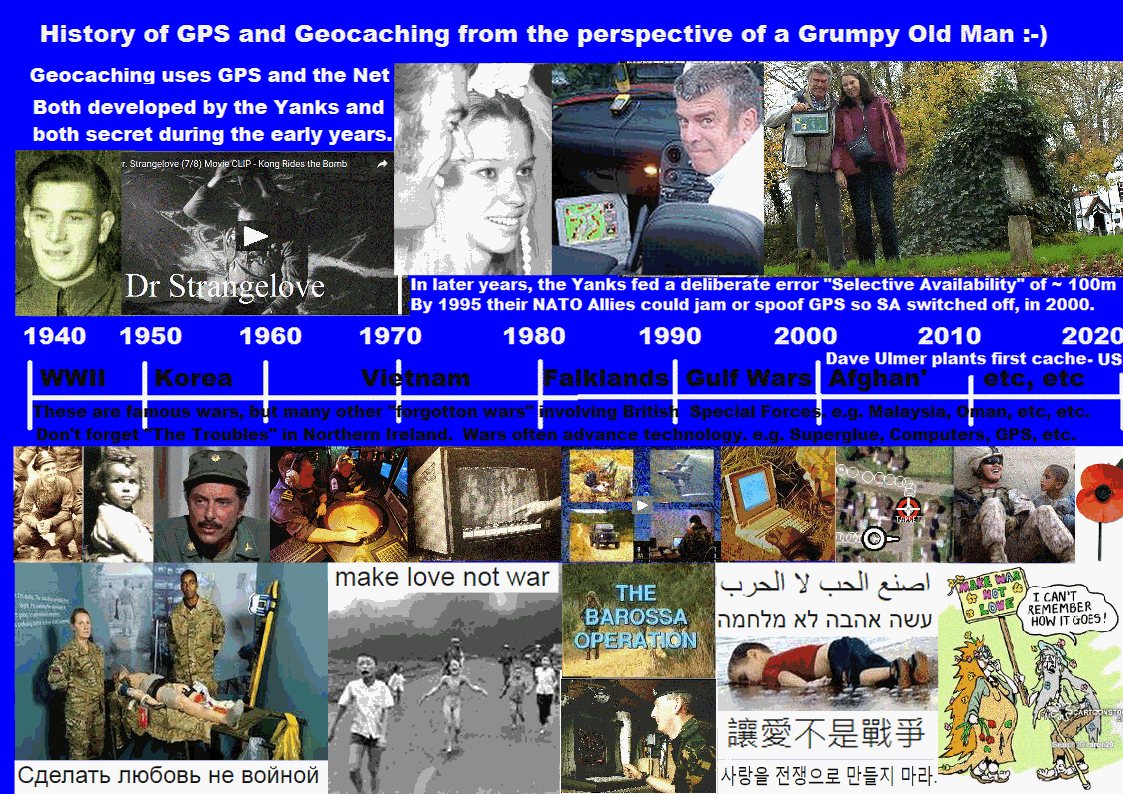
The next slide looks at events from 2000 until now. e.g. the vastly increased number of geocaches, including "micros" :-(
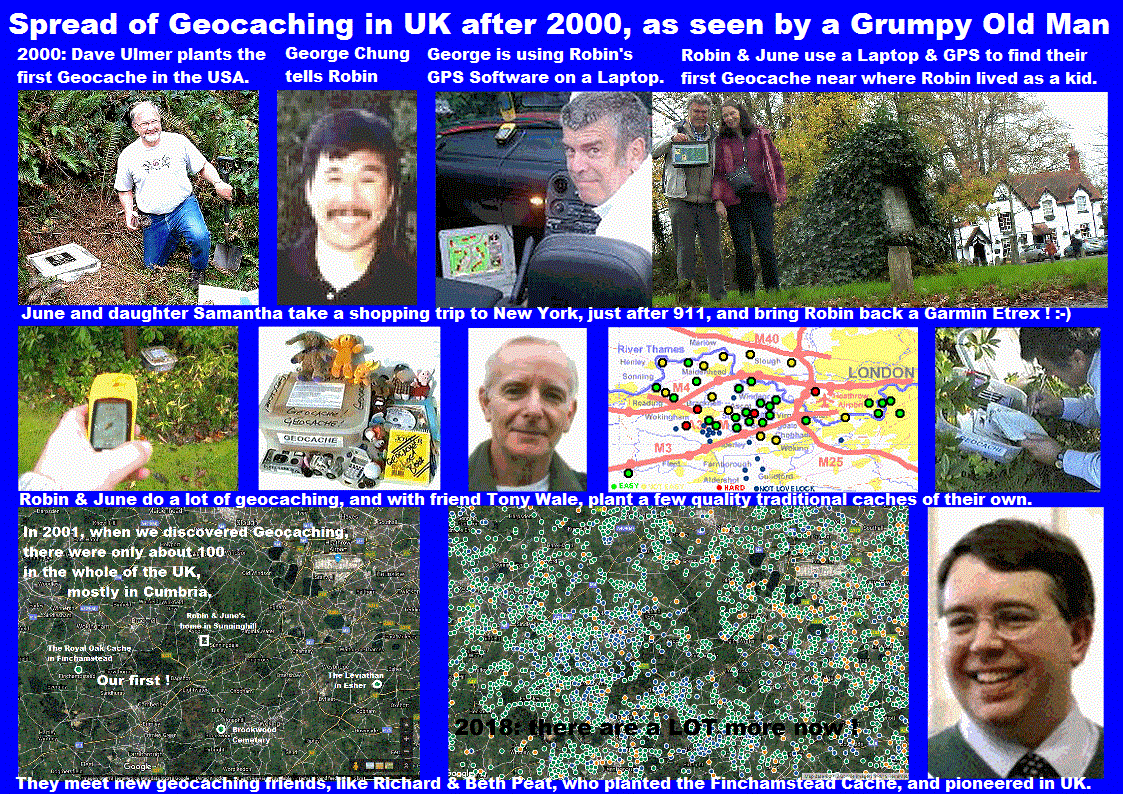
There have been
 visitors to this page since 4th April 2016. We never bothered to count before then :-)
visitors to this page since 4th April 2016. We never bothered to count before then :-)



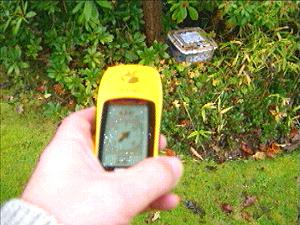 Geocaching is a new "treasure hunt" hobby which relies on the Internet,
GPS, and peoples willingness to get outside, in the open air. It only
started in May 2000, in the USA, after the Americans switched off the
deliberate error which had degraded the accuracy of GPS systems.
Now any cheap hand-held GPS will pinpoint your position
and guide you to within a yard or two of the hidden geocache.
These geocache positions are on the Net.
Geocaching is a new "treasure hunt" hobby which relies on the Internet,
GPS, and peoples willingness to get outside, in the open air. It only
started in May 2000, in the USA, after the Americans switched off the
deliberate error which had degraded the accuracy of GPS systems.
Now any cheap hand-held GPS will pinpoint your position
and guide you to within a yard or two of the hidden geocache.
These geocache positions are on the Net.
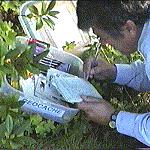 The majority of Geocachers simply search for geocaches planted
by others. This may often be combined with a trip to, and a walk
around, an area that they have not visited before.
Other Geocachers will hide a container in an interesting
location (historical, scenic, personal importance),
and will post the GPS coordinates to a Geocaching
web site page.
The page will include the latitude longitude coordinates,
a cache and terrain difficulty level,
and a description of the area and/or container
contents. It may also include what amounts to
a "tourist guide" of the area illustrated with pictures.
e.g. hints of good spots to visit or things to do.
Those finding the cache will take an
item, leave an item, make a log entry into the log
book, and then post a visit report or "log" on the web site page.
If they cannot find it, then this is also reported.
The majority of Geocachers simply search for geocaches planted
by others. This may often be combined with a trip to, and a walk
around, an area that they have not visited before.
Other Geocachers will hide a container in an interesting
location (historical, scenic, personal importance),
and will post the GPS coordinates to a Geocaching
web site page.
The page will include the latitude longitude coordinates,
a cache and terrain difficulty level,
and a description of the area and/or container
contents. It may also include what amounts to
a "tourist guide" of the area illustrated with pictures.
e.g. hints of good spots to visit or things to do.
Those finding the cache will take an
item, leave an item, make a log entry into the log
book, and then post a visit report or "log" on the web site page.
If they cannot find it, then this is also reported.
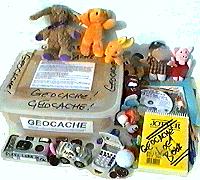 The most important and essential item in a geocache is the log book,
together with pens and pencils. Visitors write their visit in the book,
along with whatever thoughts they wish to share with others. They will
normally append a similar report as their "log" on the geocaching web site.
The contents of a geocache will change, as people visit it,
take things out, and put other things in. Many include an instant camera,
so that visitors can take a picture of themselves, perhaps taken during
a walk around the area. Other items might include small, low cost toys
and "fluffy animals" to appeal to a wide audience.
The most important and essential item in a geocache is the log book,
together with pens and pencils. Visitors write their visit in the book,
along with whatever thoughts they wish to share with others. They will
normally append a similar report as their "log" on the geocaching web site.
The contents of a geocache will change, as people visit it,
take things out, and put other things in. Many include an instant camera,
so that visitors can take a picture of themselves, perhaps taken during
a walk around the area. Other items might include small, low cost toys
and "fluffy animals" to appeal to a wide audience.
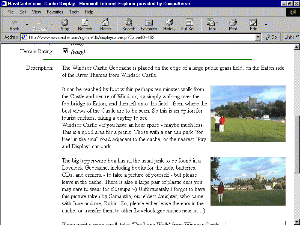 The most popular Geocaching web site for over 10 years is
The most popular Geocaching web site for over 10 years is
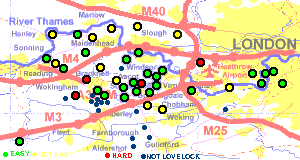
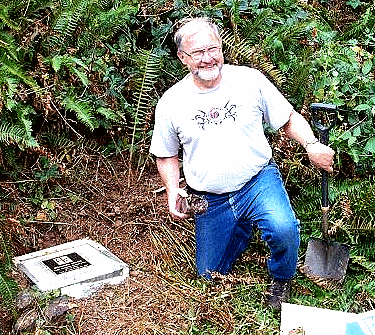
 Tony Wale introduced Orienteering as a training subject to The
British Army, where he spent 17 years until 1972. He then joined
Silva, the Swedish compass and navigation equipment manufacturer,
and became the UK Managing Director - a post held until very recently.
He has been active in the ancient and geocaching-like hobby of "letterboxing"
for over 5 years.
He is a fellow of the Royal
Institution of Navigation and The Royal Geographic Society, and is
an acknowledged expert within the UK on navigation "on foot" - frequently
being asked to give presentations or submit articles on the subject.
Tony lives in Ammanford, Wales and can be contacted on tel: +44 1269 850990
and email:
Tony Wale introduced Orienteering as a training subject to The
British Army, where he spent 17 years until 1972. He then joined
Silva, the Swedish compass and navigation equipment manufacturer,
and became the UK Managing Director - a post held until very recently.
He has been active in the ancient and geocaching-like hobby of "letterboxing"
for over 5 years.
He is a fellow of the Royal
Institution of Navigation and The Royal Geographic Society, and is
an acknowledged expert within the UK on navigation "on foot" - frequently
being asked to give presentations or submit articles on the subject.
Tony lives in Ammanford, Wales and can be contacted on tel: +44 1269 850990
and email:
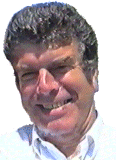 Robin Lovelock spent most of his working life in the defence business,
cutting his teeth on military computers in the 1960's with Ferranti.
He then worked for 10 years as a senior NATO scientist, followed by
13 years in senior management with EASAMS, the Systems House of GEC-Marconi
in the field of Military Command & Control Systems. In 1990 he took a
closer personal interest in the application of GPS and PC based software,
and his GPS Software business has been a full time occupation since 1995.
Robin lives and works from home in Sunninghill, England. Tel: +44 1344 620775. Email:
Robin Lovelock spent most of his working life in the defence business,
cutting his teeth on military computers in the 1960's with Ferranti.
He then worked for 10 years as a senior NATO scientist, followed by
13 years in senior management with EASAMS, the Systems House of GEC-Marconi
in the field of Military Command & Control Systems. In 1990 he took a
closer personal interest in the application of GPS and PC based software,
and his GPS Software business has been a full time occupation since 1995.
Robin lives and works from home in Sunninghill, England. Tel: +44 1344 620775. Email:
 Robin shows Sevan a GPS... Poppy & Sam find the geocache... Tony Wale explains...
Robin shows Sevan a GPS... Poppy & Sam find the geocache... Tony Wale explains...







